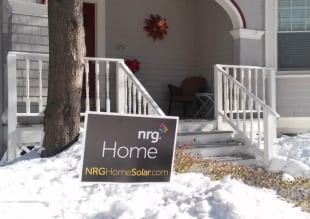NRG Energy, one of America’s biggest competitive energy suppliers, is “resetting” itself in an effort to tighten its balance sheet, unlock $1 billion in capital, and clearly define the clean energy piece of the business.
 NRG CEO David Crane outlined the plan on an investor call this morning, saying he wanted to keep the company’s “green” initiatives “at arm’s length” from the fossil fuel side of the business.
NRG CEO David Crane outlined the plan on an investor call this morning, saying he wanted to keep the company’s “green” initiatives “at arm’s length” from the fossil fuel side of the business.
The change comes only a year after Crane carved NRG into three distinct entities: NRG Business, NRG Home and NRG Renew. His intention at the time was to separate the wholesale, retail and disparate green portions of the company. However, there was still a lot of crossover between the conventional business and clean energy business, which confused investors.
Stockholders also worried that NRG was sinking too much money into its solar business without strong results. The company has consistently missed installation targets and spent far more on marketing than it planned.
NRG’s stock has fallen by more than 30 percent since the spring, partly because of investor concerns about the company’s cash-burn rate in clean energy.
 David Crane has been very vocal about his vision for creating the Apple or Google of the electricity sector. Executing on that vision has been difficult so far — at least as the company is currently structured.
David Crane has been very vocal about his vision for creating the Apple or Google of the electricity sector. Executing on that vision has been difficult so far — at least as the company is currently structured.
In order to simplify itself, NRG will spin off a “GreenCo” in January 2016. The public company will include residential and commercial solar, electric-vehicle charging, home energy management, and anything else unrelated to fossil fuels. Many of NRG’s large-scale solar assets will get sold to its YieldCo, NRG Yield.
“NRG’s green businesses focused on capturing the benefits for NRG shareholders need to be more nimble, lower-cost, and cash-sensitive,” read the investor presentation explaining the reset plan.
The company plans to be very disciplined in its spending. Crane said he will give the GreenCo a “financial limit” of $125 million in 2016. The GreenCo could, in theory, raise more money on the capital markets. But NRG will not provide more than $125 million in order to make it “stand on its feet.”
There will be consequences to overspending. “If it can’t reduce its burn rate, [the GreenCo] will need to shut down one of its own businesses,” said Crane.
NRG will also consider selling large chunks of the GreenCo if it fails to reach targets and the right buyer emerges.
“We wouldn’t be looking to sell 100 percent of it. But we would be interested in selling a majority or a piece of it to a potential partner,” said Crane.
Investor pressure was clearly a factor in today’s announcement. (On the call, Crane said, “I know my credibility with some of the people on the call isn’t great.”) But there could be another positive element to the spinoff.
“NRG is betting that there really is a green premium,” said Tom Konrad, manager of the green global equity income portfolio (and a contributor to GTM).
More and more investors are looking to channel their portfolios away from fossil fuels. Under a fossil-free strategy, they can’t invest in NRG as currently structured. Konrad believes the clear separation between green and brown resources may pay off for the company.
“There are investors who won’t buy coal, which means they won’t buy the solar or EV piece of NRG’s business either. Currently, there’s not a major premium for being green — but we seem to be moving back to a world where there will be one,” said Konrad.
Whether or not investors value NRG’s pure-play strategy differently, Konrad believes that the spinoff makes sense.
“With a company like NRG, there’s a conglomerate discount — a company like that doesn’t trade as high as the sum of its parts. This helps split out the growth opportunities, which tend to be more highly valued,” said Konrad.
Aside from the $125 million allocated for the GreenCo, Crane admitted that there was “little to divulge” about the entity’s structure or leadership. However, he did express his faith in the potential of the GreenCo, assuming it can maintain “financial rigor.”
“We fundamentally believe that GreenCo has significant value. Now is not the time to abandon GreenCo,” he said.
This article was first published at Greentech Media, where you can also hear a podcast discussing the issue. Reproduced with permission.










